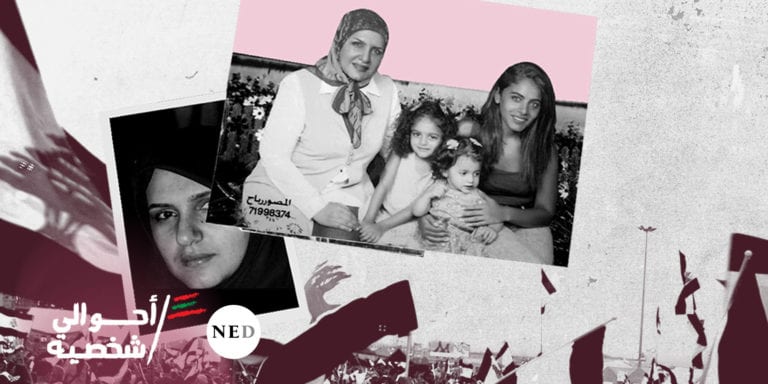“Ja’fari, Sharia, Christian, Druze. Fifteen courts of law control me. Eighteen sects renounce me,” goes the song «All Hail Civilization,» launched at the time when the Ja’fari courts persist in failing Lebanese women. Recent events have brought back into the spotlight the discriminatory facet of the Ottoman-era laws governing custody, alimony, and almost every aspect of a divorcee’s life.
As this troubled country wavers at the edge of economic implosion and utter political mess, the all-encompassing nature of the current multidimensional crisis is heralding further misery for Lebanese women. While everyone is suffering, single mothers are bearing the brunt of an unprecedented economic fallout and facing the whammy of systematic discrimination in religious courts.
Lebanese women’s economic hardship is due to multiple factors. The devaluation of the local currency by 85% is one factor. The systematic discrimination in religious courts is another.
Just last month, the Ministry of Justice announced the formation of a legal committee whose mission is to conduct a study and prepare a report setting out its reasoned conclusions on two main questions:
If both parties agreed to deliver foreign currency payments, does the debtor have the right to pay in local currency? Should the 1,507 exchange rate, which now applies only to imports of some staple goods, be considered the official rate? If not, how does the judiciary then determine the exchange rate?
Although the committee was given one month to accomplish its mission, a group of legislators rushed to issue a statement clarifying that it is not the judiciary’s task to determine the dollar exchange rate. Thus, the committee cannot possibly propose a law that allows judges to manipulate the exchange rate. The deadline has already passed, though, and the committee has not released any outputs just yet.
“Court Victory for Women’s Rights”
In a precedent-setting ruling, the Execution Department in Nabatiyeh, chaired by Judge Ahmad Mezher, has sided with a single mother, prioritizing the best interest of her daughter. “Court victory for Lebanese women’s rights” has made headlines across the country for the past few weeks. However, it all started in July 2020, when a man reported to the Ja’fari courts, claiming that he was unable to pay the alimony for his daughter in dollars (200$) – as decided in the ruling issued by the same courts in 2015 – on the pretext of a shortage of dollars.
The objection was overruled, though, because “the courts are usually reluctant to modify an existing alimony unless the reasons are compelling and a new agreement is reached between both parties.” The man then offered to raise the alimony amount to 500,000 LBP instead of 300,000 LBP, insisting that his ex-wife cannot force him to pay in a foreign currency and cannot refuse a payment made in national currency. But the single mother refused the offer and asked for dollars instead.
When the case reached Judge Mezher, he stressed the Obligations and Contracts code, stating that “the value of a currency is determined by its purchasing power.” Consequently, he ruled in favor of the single mother and her 7-year-old daughter, giving the father two options: either pay in dollars or pay in Lebanese pounds according to the dollar exchange rate on the free market. “
The case is one of many such disputes currently before the courts and seeking urgent resolution, and Judge Mezher’s ruling could set a precedent as single mothers across the country to grapple with similar issues,” Alia Awada, co-director of Fe-Male, a prominent feminist NGO in Lebanon, told Daraj.
Daraj tried to reach out to the single mother, but she refused to speak to us. However, we knew from a source close to the family that the father made an appeal and was granted a stay of execution. “It’s now up to the Court of Appeal to challenge or agree with that decision,” lawyer Amal Hamdan clarified.
Unequal and Unprotected
In a report “Women’s Rights under Lebanese Personal Status Laws,” Human Rights Watch offered in 2015 a general overview of personal status laws explicitly permitting discrimination against women. All of the women interviewed by HRW had experienced a lack of material assistance during legal proceedings. Notably, they all agreed that religious courts lack oversight and accountability. The case above is no exception. In his objection statement, the father claimed that he could not pay the alimony in dollars due to a shortage of dollars. Little did the Ja’fari courts investigate to know that the father has his own business in Africa. “Ja’fari court orders requiring fathers to pay alimony are most often minimal amounts and do not reflect the child’s actual needs nor the father’s financial capability,” Zeina Ibrahim, founder of the Protecting Lebanese Women organization, told Daraj. She agrees that measures to prevent fathers from falling behind on their child’s alimony are necessary as well. “In many cases, single mothers find themselves stripped of all financial resources after leaving their husbands, and thus, it is almost impossible for them to take legal action against the father who refuses to pay,” she adds.
“Corruption is Underneath the Turbans”
In 2019, Shiite mothers gathered in front of the Higher Islamic Shiite Council in Beirut chanting, “corruption, corruption, it’s underneath the turbans.” The controversial slogan decried laws that give religious courts a say over multiple aspects of their personal lives. “Most often, women have to petition court orders to claim their rights,” Awada assures. She declares that legal obstacles keep them from enforcing their limited rights and hence, proposes that personal status laws must be reformed to protect women and prioritize the best interest of their children.
الفساد الفساد جوا العمامات
— Thaer Ghandour (@thaerghandour) November 5, 2016
المحاكم الشرعية فساد ومحسوبية
المحاكم الشرعية ضد الانسانية#مع_فاطمة_ضد_المحكمة_الجعفرية pic.twitter.com/kiujM6dMMV
The Way Out
Lebanese women’s economic hardship is due to multiple factors. The devaluation of the local currency by 85% is one factor. The systematic discrimination in religious courts is another. Since July 2020, nine months have passed, and the 7-year-old daughter is still awaiting her right to alimony. Judge Mezher has done something right in that matter. Yet, as women, we can no longer rely on the judge’s compassion or diligence, the psyche or the husband’s morals, or the sympathy of public opinion to obtain our most basic rights. The storm won’t pass, and the suffering won’t end unless we adopt a civil code that ensures equal rights for all Lebanese, regardless of gender or religion. Joumana Haddad, a prominent feminist who has a long history in quenching the flames of oppression and inequality, told Daraj, “only when we put an end to religion’s interference with the state will we change from dispersed groups to a population and from members of sects to citizens before the law. This begins with a civil personal status law and a political representation on a non-sectarian basis. This is our revolution. This is our battle.”
Read Also:







